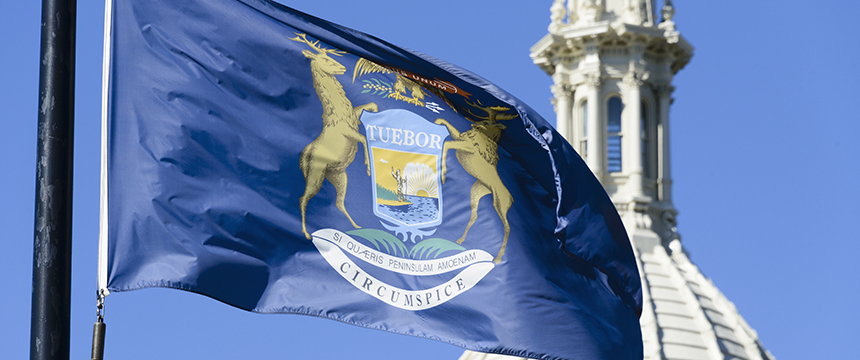
On Tuesday, April 13, 2021, Michigan Governor Gretchen Whitmer signed a certificate of need authorizing an extension of the Michigan Occupational Safety and Health Administration (“MIOSHA”) COVID-19 Emergency Rules (the “Emergency Rules”). The Emergency Rules were originally set to expire on April 14, however, the Administrative Procedures Act allows for one six-month extension. The Emergency Rules may now remain in place through October 14, 2021.
Under the MIOSHA Emergency Rules – issued to replace portions of executive orders deemed unconstitutional by the Michigan Supreme Court – employers are required to put in place a COVID-19 Preparedness and Response Plan. Critically, as part of the response plan, employers must adopt a policy prohibiting in-person work for employees to the extent that their work activities can feasibly be completed remotely. The Emergency Rules also dictate that employers must conduct exposure determinations and health surveillance for all employees, provide personal protective equipment for use on the job, and provide training on infection control. Employer resources for implementing the Emergency Rules’ protocols – including a sample COVID-19 Preparedness and Response Plan – may be found here.
Business leaders have remained vocal opponents of the remote work protocol portions of the Emergency Rules, and groups like Reopen Michigan Safely have lobbied extensively for in-person work to resume. Last month, Governor Whitmer responded by announcing the creation of a Michigan Department of Labor and Economic Opportunity working group. The group is tasked with advising the administration on how workers can safely return to offices. A day prior to the renewal of the Emergency Rules, the Governor also stressed that she did not believe residents would remain working from home for another six months. She also clarified that the Emergency Rules could be rescinded at any time if COVID-19 infection statistics permit.
However, calls for loosening restrictions have been tempered in recent days by a severe new surge in cases. The surge, which health experts are linking to the spread of variants of the virus and relaxed social-distancing restrictions, has caused Michigan to lead the nation with higher case rates than any other state. On April 5th, the Michigan Department of Health and Human Services (MDHHS) issued new guidance that reinstates a 14-day quarantine standard for those who have had “close contact” with someone who has had COVID-19 to address the rapid rise in case numbers. On April 12, the Director of the U.S. Centers for Disease Control and Prevention stated that Michigan should “close things down” to help address the outbreak, and Governor Whitmer similarly called for (on a voluntary basis) high schools to offer remote education for two weeks after spring break, youth sports to pause all activities for two weeks and people to avoid eating indoors at restaurants for the same amount of time. Despite these calls to limit activities, many schools and businesses have opted to remain open.
COVID-19 continues to impact companies in all sectors of the economy. Foley is here to help our clients effectively address the short-term and long-term impacts on their business interests, operations, and objectives. Foley provides insights and strategies across multiple industries and disciplines to provide timely perspective on the wide range of legal and business challenges that companies face conducting business while dealing with the impact of the coronavirus. Click here to stay up to date and ahead of the curve with our key publications addressing today’s challenges and tomorrow’s opportunities. To receive this content directly in your inbox, click here and submit the form.



